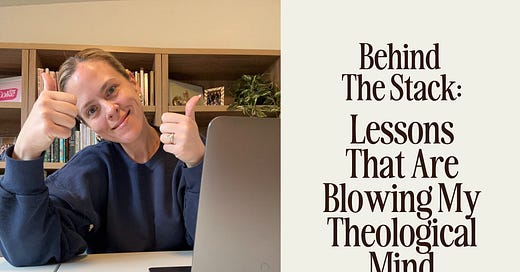Behind The Stack: Lessons That Are Blowing My Theological Mind
5 pivots that have kind of changed everything for me
For twenty years, I felt like a kid with my face pressed against the glass. I watched my husband, other people I admired, and most pastors I knew go to seminary and have their minds and hearts expanded by the truths they learned. I did my best to study and search on my own, knowing that wisdom is never limited to a classroom. But I also knew there was a part of me that had to go to seminary one day.
I fully expected to be overwhelmed by seminary in the best way.
I fully expected to walk around with my jaw open.
And my expectations were correct.
Almost every week while I’m studying, I exclaim out loud, “Oh my gosh, I love the Bible so much,” or, “Oh my gosh, I love God so much,” or even, “Gosh, people are so smart.”
So today, I’m reaching back through my notes from the past six semesters and sharing a few snippets of my favorite things I’ve learned, relearned, or wrestled with during seminary so far.
01. The Bible is not written TO us, it is written FOR us.
This was one of the first phrases I heard in seminary, and I can’t tell you how many times I’ve repeated it since, especially when teaching scripture. When Moses wrote Genesis, we weren’t his intended audience. When Paul wrote to Timothy, he was speaking to someone he knew intimately, with shared history. That matters. It changes how we read, understand, and apply the Bible.
The great news is that Scripture is still written for us. God intended every word for our good. It’s all profitable for teaching, rebuking, correcting, and training in righteousness. (Those are Paul’s words to Timothy, but God’s word for us.)
Any time we want to understand a passage, we need to ask: Who was this written to? Who was this written by? What was the historical and cultural context? And the best part is, anyone can do that kind of study. Seminary or not.





